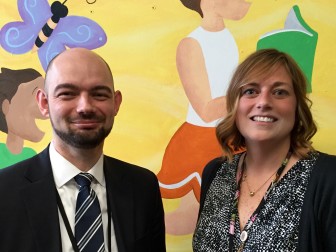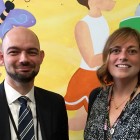Neena Kumar is a parent at Clinton School.
On a snowy Friday morning in February, I cautiously made my way up the long front path leading to Clinton School in Maplewood, NJ. The morning storm had come with little warning, and Clinton did not have a delayed opening, or a clear path to enter the school. About halfway up the walk I saw Timothy Beaumont, the new Assistant to the Principal at Clinton. He was one of two staff members shoveling the path. “I’ll be inside in a minute,” Beaumont assured. We were scheduled to meet. “Just have to finish the path first.”
Beaumont on the path, I would soon find out, was emblematic of Clinton School’s new vision. Principal Ann Bodnar is pairing with Beaumont to form a collaborative, reflective, and grass roots approach to the educational environment, distinct from the previous administration. For nine years Ms. Bodnar was assistant to Clinton’s recently retired and beloved Principal Patricia O’Neill. While Bodnar has relied on her knowledge about the history and culture of Clinton to guide her vision, she has already put her own stamp on the school.
Bodnar and Beaumont are champions of an educational view envisioned by Stephan Covey et al in “The Leader in Me: How Schools Around the World are Inspiring Greatness, One Child at a Time.” Covey, the author of “The 7 Habits of Highly Effective People,” collaborated with educators and other professionals to translate tips for personal success onto the school environment. Thick with ideas and examples of positive outcomes in schools, this book describes each child as having a learning style as unique as his fingerprint. Uncovering an individual’s strengths, while scaffolding a child’s vulnerabilities is the job of the teaching and administrative staff. There is not a one size fits all system of educating; potentially there are as many styles of learning as there are people in the building. Adults – principals, teachers, staff, and parents – must be supported and inspired in the same way as the children in the school. Theoretically, when those in the school feel supported, known and understood, conflicts, interventions and disciplinary needs diminish. Additionally, test scores and learning may naturally increase.
This style of learning and leading, described and endorsed by Bodnar and Beaumont is like that championed by Superintendent John Ramos. In his March 2015 Letter to the District Learning Committee, Ramos describes a collaborative rather than authoritative view of his leadership with students in an empowered role, “The BOE and Superintendent are on the bottom supporting up (central office staff, etc.), central office staff is supporting up (building administration, etc.), building administration is supporting up (teachers and staff, etc.), teachers and staff support up, and on top, the ultimate beneficiary is the client – our students and families.”
During two PTA meetings at Clinton School in January, Bodnar and Beaumont laid out five initiatives to support our district and their own philosophical underpinnings: adding more play to kindergarten (with the teacher watching to better understand the child’s learning style), an evaluation of assigned homework to make sure it is needed and meaningful, increasing building wide understanding of conflict resolution, empowering students to become leaders (such as by allowing students to lead assemblies), and encouraging all staff to continue their own education. The later initiative has a dual purpose — to support the staff’s well being and to model lifelong learning for the students.
Less than two months into their tenure, Bodnar and Beaumont are still tweaking their ideas and making changes to their plans. Perhaps this will always be their style — they intend to be flexible and open minded about their approach. During the month of March all Clinton staff will be trained in Restorative Practices by the International Institute of Restorative Practices. Restorative practices bring together those who have caused harm with those they have harmed. Restoring the relationship, or perhaps even building a new and better relationship, may be done by communicating and creating empathy between the students.
Empathy as an emphasis warm’s this psychologist’s heart (Full disclosure: I am a psychologist, Clinton mom, and was absolutely inspired after meeting with Bodnar and Beaumont). However, it is probable there will be empathic breeches and unforeseeable issues as Clinton moves forward. Stay with us as we continue to explore the implementation of Bodnar and Beaumont’s ideas at Clinton. Readers will be introduced to a micro view of an ideological change in our district. Next month we will describe the restorative practice training as well as its implementation. Meet you then!
Writers note: Bodnar and Beaumont are currently asking for donations to support creative play in the kindergarten and first grade classrooms. For instance, strategy games, legos, play dough, buttons, and other “crafty things”. Use your imagination to think of what else might work well!




